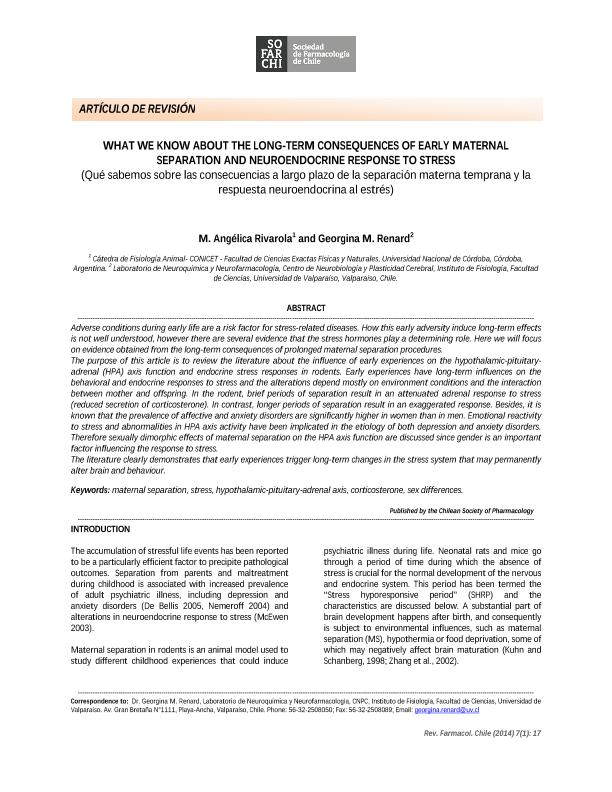Artículo
What we know about the long-term consequences of early maternal separation and neuroendocrine response to stress
Título:
Qué sabemos sobre las consecuencias a largo plazo de la separación materna temprana y la respuesta neuroendocrina al estrés
Fecha de publicación:
04/2014
Editorial:
Sociedad de Farmacología de Chile
Revista:
Revista de farmacología de Chile
ISSN:
0718-8811
Idioma:
Inglés
Tipo de recurso:
Artículo publicado
Clasificación temática:
Resumen
Adverse conditions during early life are a risk factor for stress-related diseases. How this early adversity induce long-term effects is not well understood, however there are several evidence that the stress hormones play a determining role. Here we will focus on evidence obtained from the long-term consequences of prolonged maternal separation procedures. The purpose of this article is to review the literature about the influence of early experiences on the hypothalamic-pituitaryadrenal (HPA) axis function and endocrine stress responses in rodents. Early experiences have long-term influences on the behavioral and endocrine responses to stress and the alterations depend mostly on environment conditions and the interaction between mother and offspring. In the rodent, brief periods of separation result in an attenuated adrenal response to stress (reduced secretion of corticosterone). In contrast, longer periods of separation result in an exaggerated response. Besides, it is known that the prevalence of affective and anxiety disorders are significantly higher in women than in men. Emotional reactivity to stress and abnormalities in HPA axis activity have been implicated in the etiology of both depression and anxiety disorders. Therefore sexually dimorphic effects of maternal separation on the HPA axis function are discussed since gender is an important factor influencing the response to stress. The literature clearly demonstrates that early experiences trigger long-term changes in the stress system that may permanently alter brain and behaviour.
Palabras clave:
Maternal Separation
,
Stress
,
Hpa Axis
,
Corticosterone
,
Sex Differences
Archivos asociados
Licencia
Identificadores
Colecciones
Articulos(CCT - CORDOBA)
Articulos de CTRO.CIENTIFICO TECNOL.CONICET - CORDOBA
Articulos de CTRO.CIENTIFICO TECNOL.CONICET - CORDOBA
Citación
Rivarola, María Angélica; Renard, Georgina Maria; What we know about the long-term consequences of early maternal separation and neuroendocrine response to stress; Sociedad de Farmacología de Chile; Revista de farmacología de Chile; 7; 1; 4-2014; 17-25
Compartir




